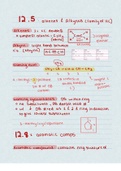Naming alkynes - Study guides, Class notes & Summaries
Looking for the best study guides, study notes and summaries about Naming alkynes? On this page you'll find 51 study documents about Naming alkynes.
Page 4 out of 51 results
Sort by
In dept handwritten notes with examples, covering alkenes and alkynes, aromatic compounds, naming those compounds, alcohols, phenols, th ions, physical properties of those groups,
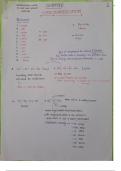
-
IUPAC Nomenclature Masterclass: Comprehensive Notes for JEE & NEET
- Class notes • 39 pages • 2024
-
- $7.99
- + learn more
The document "IUPAC Nomenclature Masterclass: Comprehensive Notes for JEE & NEET" is a detailed and meticulously crafted study resource aimed at helping students prepare for the chemistry section of the Joint Entrance Examination (JEE) and the National Eligibility cum Entrance Test (NEET). This comprehensive guide covers the intricate rules and conventions of IUPAC (International Union of Pure and Applied Chemistry) nomenclature, which is essential for naming organic compounds accurately. ...
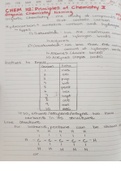
-
CHEM 112: Summary of Naming Line Angle Organic Compounds
- Summary • 10 pages • 2022
-
- $7.99
- + learn more
This is a summary of naming line angle hydrocarbons: alkanes, alkenes, and alkynes. It covers how to name substituents, and naming when there are double, single, and triple bonds. Cycloalkanes, cycloalkenes, and cycloalkynes are also included. Other topics are structural isomers, writing the condensed structural formula, a list of functional groups, and how to determine cis from trans.

-
iupac for neet 2024
- Summary • 74 pages • 2024
-
Available in package deal
-
- $8.99
- + learn more
IUPAC Nomenclature: In the NEET syllabus, students are expected to understand the systematic naming of organic compounds according to the rules laid out by the International Union of Pure and Applied Chemistry (IUPAC). This includes naming alkanes, alkenes, alkynes, cyclic compounds, functional groups, and substituents following specific guidelines. Understanding IUPAC nomenclature is essential for correctly identifying and communicating the structures of organic compounds.
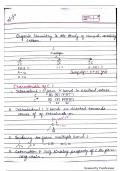
-
iupac nomenclature
- Class notes • 66 pages • 2024
-
Available in package deal
-
- $15.49
- + learn more
IUPAC (International Union of Pure and Applied Chemistry) nomenclature is a systematic way to name chemical compounds based on their structure and composition. It ensures clarity and consistency in communication among scientists globally. The rules specify prefixes and suffixes to denote the type and arrangement of atoms in molecules. For example, alkanes end with "-ane," alkenes with "-ene," and alkynes with "-yne," indicating single, double, and triple bonds respectively. Functional grou...
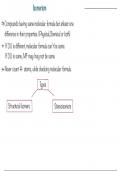
-
iupac and isomerism notes for neet exams 2024
- Class notes • 57 pages • 2024
-
Available in package deal
-
- $9.99
- + learn more
IUPAC Nomenclature: In the NEET syllabus, students are expected to understand the systematic naming of organic compounds according to the rules laid out by the International Union of Pure and Applied Chemistry (IUPAC). This includes naming alkanes, alkenes, alkynes, cyclic compounds, functional groups, and substituents following specific guidelines. Understanding IUPAC nomenclature is essential for correctly identifying and communicating the structures of organic compounds. Isomerism: Isomeri...
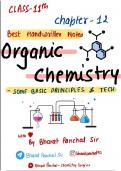
-
Class 11 Organic Chemistry Handwritten Notes
- Interview • 24 pages • 2024
-
- $3.49
- + learn more
Organic chemistry in Class 11 introduces key concepts. Understand hydrocarbons, the building blocks of organic compounds. Alkanes consist of single bonds, alkenes have double bonds, and alkynes contain triple bonds. Learn isomerism, where molecules share a molecular formula but differ in structure. Delve into functional groups like alcohols, aldehydes, ketones, and carboxylic acids. Grasp the importance of resonance in stabilizing molecules. Comprehend reaction mechanisms, including substitution...
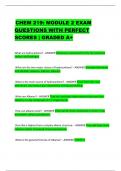
-
CHEM 219: MODULE 2 EXAM QUESTIONS WITH PERFECT SCORES | GRADED A
- Exam (elaborations) • 20 pages • 2024
-
- $9.49
- + learn more
CHEM 219: MODULE 2 EXAM QUESTIONS WITH PERFECT SCORES | GRADED A What are hydrocarbons? - ANSWER Molecules composed of only the elements carbon and hydrogen What are the two major classes of hydrocarbons? - ANSWER Aromatic (benzene) and aliphatic (alkanes, alkenes, alkynes) What is the main source of hydrocarbons? - ANSWER Fossil fuels like coal, petroleum, and natural gas obtained by mining and drilling. What are Alkanes? - ANSWER They are saturated hydrocarbons because their sk...

-
Organic Chemistry 1 Chapters 9, 10 and 11
- Class notes • 15 pages • 2023
- Available in package deal
-
- $10.49
- + learn more
Chapter 9 introduces alkynes. Students should already have prior knowledge about alkenes and will be pleased to know that the IUPAC naming system is similar. Students will learn how alkynes can be reduced into alkenes or alkanes. It is also important to take note of the different reagents and bases used to carry out these reactions. Students will also learn how carbon atoms can be added to or eliminated from a chain. Chapter 10 then introduces radical reactions which will be a very new concept t...

-
Organic Chemistry 1 Chapters 12 and 13 (Final Chapters)
- Class notes • 9 pages • 2023
- Available in package deal
-
- $10.49
- + learn more
Chapters 12 and 13 wrap up the Organic Chemistry 1 class. We begin Chapter 12 to learn about alcohols and phenols. Students should already have extensive knowledge about alkanes, alkenes and alkynes. They will then learn how the IUPAC name for alcohols differs slightly. They will also learn about oxidation and reduction reactions and how to recognize one. Additionally, students will learn about Grignard reagents and how they contribute to oxidation and reduction reactions. It is also important f...

Did you know that on average a seller on Stuvia earns $82 per month selling study resources? Hmm, hint, hint. Discover all about earning on Stuvia

